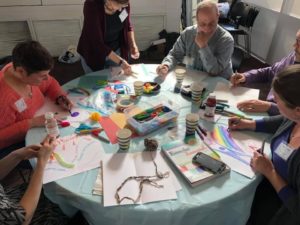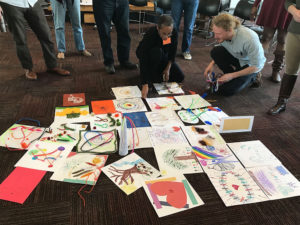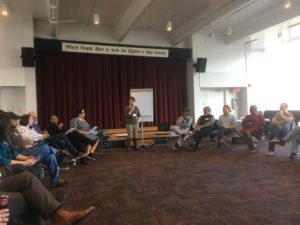Connection and Collaboration: Building a Better Humanism

Last month’s second-ever Humanist Collaboratory brought nearly forty humanist leaders from across the United States (and one from Canada) to the Washington Ethical Society to build relationships, foster a more cohesive humanist community, and strengthen, together, the future of humanism. Through small and large group discussions, self-reflections, games, and art projects, we sought to connect with one another over our shared goals and unique experiences.
The first Humanist Collaboratory, hosted in 2017, focused on bringing together humanist clergy or leaders of humanist congregations, including Ethical Culture leaders, Unitarian Universalist ministers, and humanistic rabbis. Amanda Poppei, the lead organizer of the collaboratory and senior leader for the Washington Ethical Society, wanted to feature an expanded guest list for 2019’s iteration of the event, and so in addition to humanist clergy, this collaboratory included organizers and leaders from secular humanist communities and organizations like Camp Quest and the American Humanist Association and its chapters.
“As we planned the event, I kept saying: what we need to do most is get the right people there. Then whatever needs to happen will emerge,” Poppei shared. “I was hoping that we would succeed in centering humanist voices that haven’t historically been at the center of institutional humanism, [people of color] and queer voices and women’s voices. I was hoping for new relationships to emerge, for connections to happen across lines that are usually held pretty strong—like the secular/religious humanist line.”
The 2019 collaboratory planning committee also included Unitarian Universalist minister Patrice Curtis and ministerial candidate Leika Lewis Cornwell, Ethical Culture Leader Emeritus Mike Franch and Leader-in-Training Christian Hayden, along with secular organizers Diane Burkholder (chair of the LGBTQ Humanist Alliance) and Luciano Joshua Gonzalez-Vega (co-chair of the Latinx Humanist Alliance). Along with other representatives from these groups, event attendees consisted of professionals in interfaith settings, humanist celebrants, and chaplains endorsed by The Humanist Society, as well as local community organizers.
 After introductions, day one began with a challenge from the organizers to design an artistic representation of what humanism means to us individually. Once our creations of yarn, glitter, marker, paper, and pipe-cleaners were assembled, we were asked to arrange them in the center of the room as a community collage. “This collective act of creating, interpreting, and molding a unified expression of humanism from many different pieces resonated as a living metaphor of the collaboratory itself,” said Kim Newton, executive director of Camp Quest. Our artwork led us to reflect on the language and ideas we use to define humanism, and the ways others might perceive it. We agreed on ideas like “human rights,” “community,” and “appreciation of what is and can be.” But other ideas—like whether or not humanism is religious or can include religious faith—ignited further exploration.
After introductions, day one began with a challenge from the organizers to design an artistic representation of what humanism means to us individually. Once our creations of yarn, glitter, marker, paper, and pipe-cleaners were assembled, we were asked to arrange them in the center of the room as a community collage. “This collective act of creating, interpreting, and molding a unified expression of humanism from many different pieces resonated as a living metaphor of the collaboratory itself,” said Kim Newton, executive director of Camp Quest. Our artwork led us to reflect on the language and ideas we use to define humanism, and the ways others might perceive it. We agreed on ideas like “human rights,” “community,” and “appreciation of what is and can be.” But other ideas—like whether or not humanism is religious or can include religious faith—ignited further exploration.
Questions about the meaning of humanism permeated the rest of the event. Who is included in humanism? What is the content? Who owns it? What is its history? Most importantly, what is its future? The collaboratory planning team made great effort to include the perspectives of many identity groups as we tried to answer these questions. During one session, we joined identity caucuses and dove into our different experiences of humanism as people of different races, genders, sexualities, religious backgrounds, and cultures. Attendees were encouraged to join whichever groups they identify with, and then we shared our insights with the larger group, providing an opportunity to learn from different perspectives. This session and the following discussion “asked that folks address some really deep things about white supremacy and how to foster belonging to the [humanist] movement from places of marginal identities,” explained Christian Hayden.
Understanding the emotional challenges of this process, organizers then led us in a silent moment of reflection and playful stretch to give our minds a rest. Throughout the two days of the collaboratory, we were reminded that the intellectual nature of our discussions need not take precedence over the physical and emotional effects on our bodies. Some noted that the tendency for us to separate our ideas from ourselves, our minds from our bodies, is the result of dominant Eurocentrism within our society and even supports our own dehumanization.
The Western dominance within contemporary understandings of humanism was a recurring theme. This was not to reject centuries of Western humanist thought, but to expand our own conceptions of humanism to be more inclusive of the countless independent expressions of humanist values across cultures and history. “It was really moving to hear people talk about indigenous worldviews and global worldviews that inspire their humanism today,” Poppei remarked, “worldviews that might not have been called ‘humanism’ but that held so many of the same values and orientation that humanists have now.”
There was widespread support among the collaborators to pay better respect to the diverse perspectives and systems of thought have been woven together to create the vibrant, collective understanding of humanism that exists today. To serve a more holistic and cohesive humanism, some attendees called for an online resource that details a more comprehensive history of the various humanist and humanist-adjacent worldviews from different cultures. Some began plans for opportunities for humanists to meet in person, including adding to already scheduled conferences and preparing for a 2020 collaboratory in Minneapolis. Attendees also called for a fourth Humanist Manifesto that decolonizes our modern, Eurocentric understandings of humanism and redefines humanism as an action-oriented life practice versus a mere set of beliefs and principles.
 The desire to reshape the definition of humanism in this way was born out of a small-group discussion facilitated by Christian Hayden that focused on the power and implications of our language choices. The participants in discussion played a few word games in an attempt to arrive at a common definition of humanism. Despite, or perhaps because of, decades of combined experience within the humanist movement, the group was unable to arrive at a shared definition that captured all of what humanism is and what it can be. “Our words create barriers,” observed Diane Burkholder while reflecting on the session. “The terminology we use does not seem to fit with many secular communities and is very Eurocentric. How can we work to make sure that folks who are newer to the community feel welcome and most importantly seen?”
The desire to reshape the definition of humanism in this way was born out of a small-group discussion facilitated by Christian Hayden that focused on the power and implications of our language choices. The participants in discussion played a few word games in an attempt to arrive at a common definition of humanism. Despite, or perhaps because of, decades of combined experience within the humanist movement, the group was unable to arrive at a shared definition that captured all of what humanism is and what it can be. “Our words create barriers,” observed Diane Burkholder while reflecting on the session. “The terminology we use does not seem to fit with many secular communities and is very Eurocentric. How can we work to make sure that folks who are newer to the community feel welcome and most importantly seen?”
We found it easier to define humanism by common goals and actions that a humanist should take. Each of us can become a better humanist every day, and in a time where the number of nonreligious folk continues to grow with diversifying expressions, an action-oriented humanism enables us to work alongside those whose beliefs may not perfectly align, but who desire similar outcomes of progress and equality. By defining humanism in such a way, we expand who is included and make our goals more attainable. Indeed, our actions speak far louder than our beliefs.
With lengthened to-do lists and strengthened relationships, each of us left the collaboratory with renewed determination and new approaches to our work in our own organizations and communities. “I’m taking away new friendships as well as great appreciation for the diversity of experience all the participants brought to the sessions,” said Newton, echoing sentiments expressed by many at the collaboratory. “I hope to use the knowledge I gained to deepen my own practice and study of humanism, and to generate new and innovative ways of collaborating with others as we aim to bring humanism to many more people and communities,” she concluded. Invigorated and empowered by new insights and bonds, we plan to bring our experiences from the 2019 Humanist Collaboratory to the wider humanist community and continue laying the groundwork for a better future.
